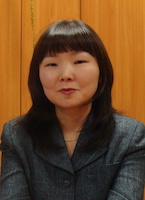Language attitudes and language loyalty of minor language speakers under the conditions of national-Russian bilingualism: the case of Buryats and Tuvans
DOI:
https://doi.org/10.25178/nit.2020.1.5Keywords:
language situation; language attitudes; language loyalty; bilingualism; Buryat language; Tuvan language; Tuva; BuryatiaAbstract
The article examines the language attitudes and orientations of modern speakers of Buryat and Tuvan languages in Russia (more specifically, in the Republic of Buryatia and the Republic of Tuva). The need for professional and cultural integration of minor language speakers into all-Russian and global space today gradually leads to the transformation of their ethno-linguistic consciousness.
For its empirical base, the study relies on the results of complex sociolinguistic surveys conducted in Buryatia (1999–2000) and in Tuva (2009–2010) according to identical methodology. However, a comparative analysis of language situations in these regions has been carried out for the first time.
Examining the evaluation characteristics of language situations in both regions revealed that the Russian language, which is demographically and functionally dominant, has a huge impact on language loyalty and language attitudes. Under the conditions of national-Russian bilingualism, speakers of minor languages choose the strategy of symbolization of the native language. This fact indirectly confirms the transformation of the linguistic consciousness of small nations. This strategy must have been triggered by adaptation mechanisms, which in their turn have been set in motion by new socio-economic conditions, informatization, and technologization of modern society. The strategy of symbolization indicates that the Russian language for the majority of Buryats and Tuvans has only functional communicative value and carries out the function of an instrumental language.
References
Anaiban, Z. V. (1996) Respublika Tuva: model' etnologicheskogo monitoringa [The Republic of Tuva: A model of ethnological monitoring]. Moscow, Institute of ethnology and anthropology of the Russian Academy of Sciences. 96 p. (In Russ.)
Bavuu-Surun, M. V. (2010) Tuvinskii yazyk na sovremennom etape: obrazovatel'nyi aspekt [Tuvan language on modern stage: educational aspect]. In: Tuvinskaya pis'mennost' i voprosy issledovaniya pis'mennostei i pis'mennykh pamyatnikov Rossii i Tsentral'no-Aziatskogo regiona [Tuvan writing and issues of writing and written monuments of Russia and the Central Asian region]. Proceedings of the international conference dedicated to the 80th anniversary of Tuvan written language]. In 2 vols. Executive editor: K. A. Bicheldei. Abakan, Khakass book publishing house. Vol. 1. 220 p. Pp. 53–57. (In Russ.)
Belikov, V. I. and Krysin, L. P. (2001) Sotsiolingvistika [Sociolinguistics]: textbook for universities. Moscow, Russian State Humanitarian University Press. 439 p. (In Russ.)
Borgoyakova, T. G. (2002) Razvitie sotsial'nykh funktsii gosudarstvennykh tyurkskikh yazykov Respublik Yuzhnoi Sibiri [The development of social functions of the state Turkic languages of the republics of Southern Siberia]: Thesis of Diss. … Doctor of Philology. Moscow. 37 p. (In Russ.)
Vakhtin, N. B. and Golovko, E. V. (2004) Sotsiolingvistika i sotsiologiya yazyka [Sociolinguistics and sociology of language]: A Textbook. Saint-Petersburg, Humanitarian Academy Press, Printing House of European University in Saint-Petersburg. 336 p. (In Russ.)
Wei Tsen Fang (2016) Gosudarstvennayaya yazykovaya politika v Respublike Tyva v kontse XX — nachale XXI vv. [State language policy in the Republic of Tuva]: Diss. … Magister of Humanitarian. State University of Chenji. Taipei. 274 p. [online] Available at: //nccur.lib.nccu.edu.tw/handle/140.119/81442 (accessed: 25.01.2017). (In Russ.)
Golovko, E. V. (2018) Yazyk kak instrument etnicheskoi samoidentifikatsii [Language as ameans of ethnic self-identification]. In: Yazykovoe edinstvo i yazykovoe raznoobrazie v polietnicheskom gosudarstve [Language unity and language diversity in a polyethnic state]: International Conference (Moscow, 14–17 November 2018): Papers and communications / Executive editors: A. N. Bitkeeva and M. A. Goryacheva. Moscow, Languages of the Peoples of the World. 752 p. Pp. 44–46. (In Russ.)
Zhuravel', T. N. (2015) Etnoiazykovaia situatsiia v Usinskoi doline Krasnoiarskogo kraia [Ethnolinguistic Situation in the Usinsk valley, Krasnoiarsk krai]: Thesis of Diss. … Candidate of Philology. Krasnoiarsk. 23 p. (In Russ.).
Dyrkheeva, G. A (2002) Buryatskii yazyk v usloviyakh dvuyazychiya: problemy funktsionirovaniya i perspektivy razvitiya [The Buryat language under the conditions of Bilingualism: Problems of functioning and prospects of development]. Ulan-Ude, Publishing house of the Buryat Scientific Center. 187 p. (In Russ.)
Dyrkheeva, G. A. (2011) Yazykovaya situatsiya v Buryatii: dvadtsat' let spustya [Language situation in Buryatia: 20 years later]. The Bulletin of the Buryat Scientific Center of Siberian Branch of the Russian Academy of Sciences, no. 2, pp. 132–138. (In Russ.)
Dyrkheeva, G. A., Darzhaeva, N. B., Bal'zhinimaeva, C. C., Boronoeva, D. Ts., Sundueva, D. B., Ayusheev, B. B. and Shozhoeva, B. D. (2009) Buryatskii yazyk v polikul'turnom prostrangstve (sociolingvoistoricheskoe issledovanie) [The Buryat language in polycultural area: a sociolingual and historical study]. Ulan-Ude, Publishing house of the Buryat Scientific Center. 232 p. (In Russ.)
Dyrkheeva, G. A., Budaev, B. Zh. and Bazheeva, T. P. (1999) Buryatskii yazyk: sovremennoe sostoyanie (sociolingvisticheskii aspekt) [The Buryat language and its contemporary status: a sociolinguistic aspect]. Ulan-Ude, Publishing house of the Buryat Scientific Center. 142 p. (In Russ.)
Ivanova, N. I. (2012) Sovremennoe kommunikativnoe prostranstvo russkogo yazyka v Respublike Saha (Yakutiya): sociopsiholingvisticheskii aspect [Contemporary communicative area of the Russian language in the Republic of Saha (Yakutia)]. Novosibirsk, Nauka. 130 p. (In Russ.)
Kondrashkina, E. A. (2010) Dinamika yazykovoi loyal'nosti u finno-ugorskih narodov Rossii [The dynamic of language loyalty of Finno-Ugric peoples of Russia]. In: Yazyk i obshchestvo v sovremennoi Rossii i drugikh stranakh [Language and society in modern Russia and other countries]: International Conference (Moscow, June 21–24, 2010): Reports and communications / Executive editors: V. A. Vinogradov, V. Yu. Mikhalchenko. Moscow, The Languages of the Peoples of the World. 608 p. Pp. 198–201. (In Russ.)
Semenova, N. B. (2009) Etnokul'tural'nye osobennosti samosoznaniya i ierarhiya zhiznennykh tsennostei v structure mirovozzreniya tuvinskoi molodezhi [Ethnocultural features of self-consciousness and hierarchy of life values in the structure of the worldview of Tuvan youth]. The Siberian Bulletin of Psychiatry and Narcology, no. 2, pp. 136–140. (In Russ.)
Sereedar, N. Ch. (2018) Tuvinskii yazyk kak sredstvo obshcheniya tuvincev: problemy i perspektivy [Tuvan language as mean of communication among Tuvans: problems and prospects]. The New Research of Tuva, no. 1 [online] Available at://nit.tuva.asia/nit/article/view/752 (accessed: 12.10.2018). DOI: 10.25178/nit.2018.1.1 (In Russ.)
Stepanova, A. A. (2015) Yazykovaya situatsiya v Respublike Tatarstan: konflikt ili tolerantnoe ravnovesie? [Language situation in the Republic of Tatarstan: conflict or tolerant balance?]. Journal of Psycholinguistics, no. 4 (26), pp. 169–181. (In Russ.)
Hilhanova, E. V. (2007) Faktory kollektivnogo vybora yazyka I etnokul'turnaya identichnost' u sovremennyh Buryat (diskurs-analiticheskii podhod) [Factors of collective choice of language and ethnocultural identity among modern Buryats: a discourse-analytical approach]. Ulan-Ude, Univ. press, 205 p. (In Russ.)
Funktsionirovanie yazykov v mnogonatsional'nom gosudarstve: Rossiya i Vietnam [Functioning of languages in multiethnic states: Russia and Vietnam] (2008). Executive editor: V. Yu. Michal’chenko. Moscow, Soviet writer publ. 451 p. (In Russ.).
Tsybenova, Ch. S. (2017) Sovremennaya yazykovaya situatsiya v Respublike Tyva: sociolingvisticheskii aspekt. [Contemporary language situation in the Republic of Tyva: sociolinguistic aspect]. Executive editor: G. A. Dyrkheeva. Irkutsk, Ottisk publ. 170 p. (In Russ.).
Tsybenova, Ch. S. (2019) Language Situation in the Tuva Republic: Social Characteristics. Oriental Studies, no. 43(3), pp. 460–477. (In Russ.) DOI: 10.22162/2619-0990-2019-43-3-460-477
Shahovskii, V. I. (2006) Emotsii — motivacionnaya osnova chelovecheskogo soznaniya [Emotions as the motivational basis of human consciousness]. Journal of psycholinguistics, no. 4, pp. 64-69. (In Russ.)
Yazyk i etnos na rubezhe vekov: Etnosociologicheskie ocherki o yazykovoi situatsii v Respublike Tatarstan [Language and ethnicity at the turn of the century: Ethnosociological essays on the language situation in the Republic of Tatarstan] (2002). Executive editor: R. N. Musina. Kazan, Magarif publ. 208 p. (In Russ.).
Leung, K. Z. (2017) Contemporary Youth Identity in the Republic of Tuva, Russia. The New Research of Tuva, no. 3 [online] Available at: https://nit.tuva.asia/nit/article/view/725 (access date: 12.10.2019). DOI: 10.25178/nit.2017.3.3
Published
How to Cite
Dyrkheeva G. A. and Tsybenova Ch. S. TLanguage attitudes and language loyalty of minor language speakers under the conditions of national-Russian bilingualism: the case of Buryats and Tuvans. The New Research of Tuva, 2020, no. 1 [online] Available at: https://nit.tuva.asia/nit/article/view/905 (access date ... ). DOI: 10.25178/nit.2020.1.5
Issue
Section

Author(s) license holder(s) grant rights for their work to the journal (grantee of a license) under the simple non-exclusive open license in accordance with Art. 1286.1 «Open license for a research work, work of literature or fine arts», Civil Code of the Russian Federation.
New Research of Tuva publishes articles under the Creative Commons Attribution-NonCommercial license (CC BY-NC).
Since it is an open license, author(s) reserve the right to upload the article to their institutional repository, submit it to another journal (if it allows republications), or republish it on their own website (in full, or in part).
However, several conditions apply here:
a) The republished version must always contain the name(s) and affiliation(s) of the author(s), the original title and the hyperlink to the original version on the New Research of Tuva website;
b) It must be in open access, free of charge, and no category of readers must be in any way whatsoever advantaged over general readership.
c) should the contribution be submitted elsewhere by its author(s) without substantial modification (30% or more of original text unchanged), the body of the article should contain a disclaimer that the original version was published in New Research of Tuva (with a link to the respective page)
The CC-BY-NC is a non-revocable license which applies worldwide and lasts for the duration of the work’s copyright.










